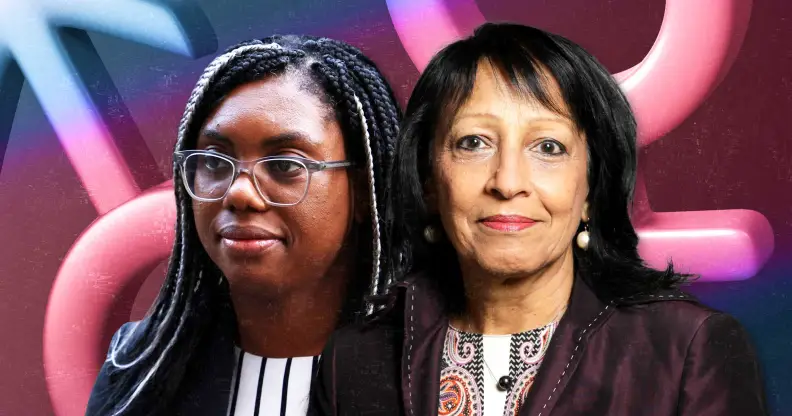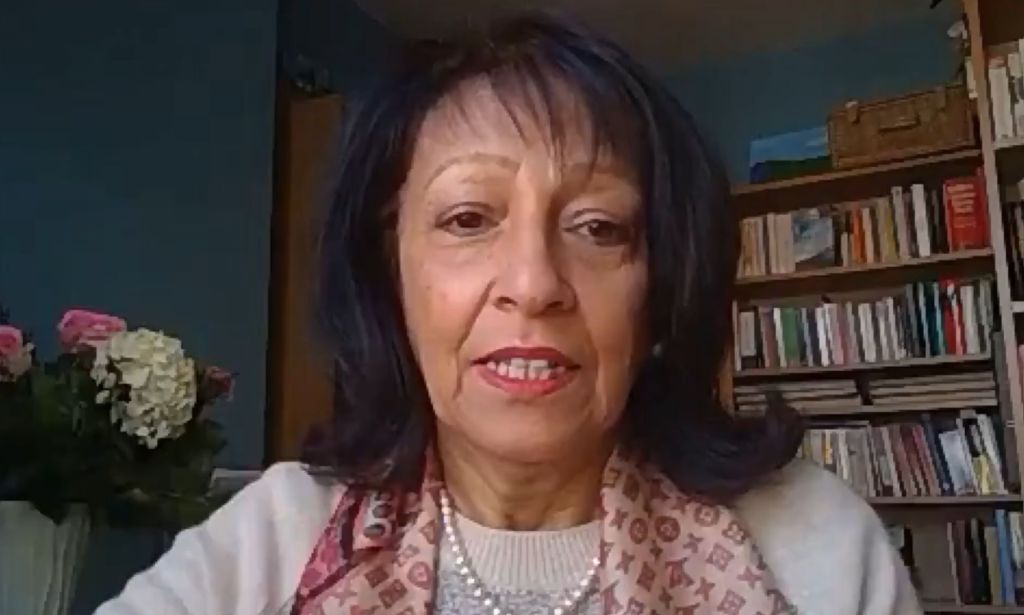EHRC wanted to give government ‘formula to discriminate’ against trans people, UN expert says

Kemi Badenoch asked EHRC chair Kishwer Falkner for advice on redefining sex. (Getty)
Kemi Badenoch asked EHRC chair Kishwer Falkner for advice on redefining sex. (Getty)
The Equalities and Human Rights Commission (EHRC) is facing fresh scrutiny over its advice on making “sex” mean “biological sex”, after the watchdog admitted its only definition for the term is “not trans”.
The EHRC came under heavy criticism after it published a letter on 4 April, addressed to equalities minister Kemi Badenoch, advising on a possible amendment to the Equality Act to define “sex” and “biological sex”.
Fears that the letter was intended to help the government strip trans people of protections were backed up by a statement from UN independent expert on sexual orientation and gender identity, Victor Madrigal-Borloz.
Writing on Thursday (11 May), Madrigal-Borloz reported meeting with an EHRC commissioner during a 10-day visit to the UK this month.
He said he was shocked to hear the EHRC had no clear definition for “biological sex”.
“UK law provides no such definition either,” he wrote. “The EHRC however specifically conceded that, in the context of the letter, the intended meaning of the term ‘biological sex’ is to define women as ‘women who are not trans’.”
The Equality Act protects against discrimination on grounds of “sex”. Trans women, for example, are able to make claims on the basis of sex-based discrimination because of their womanhood – changing the definition of sex under the act would make this no longer possible, even for trans women who have a Gender Recognition Certificate (GRC).
The EHRC commissioner reportedly confirmed to Madrigal-Borloz: “Under the Equality Act, […] a trans woman who does have a GRC is a woman under the current case law.
“If the government decides to make the amendment, they don’t need to define biological sex, they can do it by way of exclusion of the [Gender Recognition Act].”
The UN expert added: “It then follows that the objective of the EHRC was to offer the government a formula through which it could carry out discriminatory distinctions currently unlawful under UK law, and that will remain so under international human rights law.”
He added that the commission’s actions are “wholly unbecoming of an institution created to ‘stand up for those in need of protection and hold governments to account for their human rights obligations'”.
Madrigal-Borloz also wrote in his report that he was “particularly alarmed” by the recommendations, noting that the Scottish commission of the EHRC had said there was not “sufficient evidence” to justify the change.
Charities condemn EHRC as a ‘failed institution’
EHRC officials recommended that the law’s definition of “sex” should be changed to “biological sex” after women and equalities minister Kemi Badenoch asked the commission for advice on what she described as a “technical and contested area of law”.
In response, the EHRC said changing the definition would result in “greater legal clarity in some areas”. As examples, it said the change would allow for the exclusion of trans men and women from sports and single-sex services such as hospital wards.

This led to a coalition of not-for-profit organisations, spearheaded by Stonewall, writing an open letter describing the EHRC as a “failed institution.”
Writing to the Global Alliance of National Human Rights Institutions, the coalition accused the EHRC of “failing to meet its basic duties” in its reports on trans people since 2021.
“The EHRC, as Great Britain’s independent national human rights institution, has not only continued to work in a way that is hostile to the rights and dignity of trans people but has escalated its interventions to a point where it is now actively advocating for a roll back of rights,” the groups said.
Th EHRC told PinkNews: “As we did in our conversation with Mr Madrigal-Borloz, we completely reject the assertion that the objective of our advice to government was to lessen human rights protections. We are disappointed he refers to this being ‘admitted’ in our meeting with him. This is incorrect.
““We have a duty to advise the UK government on the effectiveness of Britain’s equality and human rights laws. In April we wrote to the minister for women and equalities to suggest a change in the definition of sex merits further consideration.
“Our objective in providing this advice was to help achieve greater legal clarity in a complex area of law. Where people’s rights may compete, we advise on how best to strike an appropriate balance. We provide this advice impartially, especially in technical areas of law that we recognise attract strong views and disagreement.”
UN expert holds ‘deep concerns’ for LGBTQ+ rights in the UK
Elsewhere in his report, Madrigal-Borloz noted that several UK institutions, including the government and the media, had contributed to “bias-motivated incidents of harassment, threats and violence against LGBT people.“
The report concluded: “All of this – by a wide range of stakeholders – attributed to the toxic nature of the public debate surrounding sexual orientation and gender identity.”
Madrigal-Borloz highlighted concerns around NHS waiting times for gender-affirming care, as well as the lack of movement in the government’s promise to ban so-called conversion therapy.
“The vicissitudes of this and other necessary public policies appear to be connected to political discourse concerning gender-diverse persons… refugees and asylum seekers, two areas in which recent state actions are cause for concern,” he said.
Several LGBTQ+ campaigners lauded the report as a “much-needed injection of common sense” into the deteriorating discussion of LGBTQ+ rights in the UK.
Amnesty International UK’s chief executive, Sacha Deshmukh, said: “The rising rhetoric of trans rights in the UK, and the real impact it is having on people’s lives and our institutions, is toxic and needs to be addressed.”
Meanwhile, LGBTQ+ activist Jayne Ozanne told PinkNews that she was “incredibly grateful” for the report, which “pulls no punches and clearly calls out the ‘abusive rhetoric’ by politicians.”

